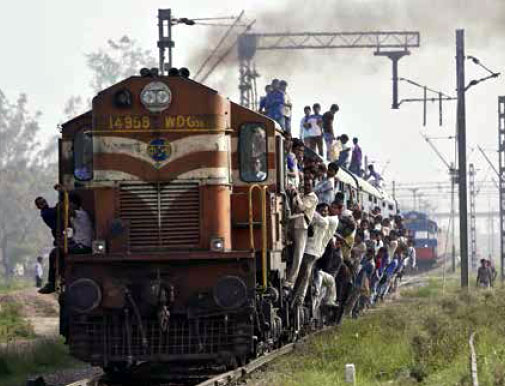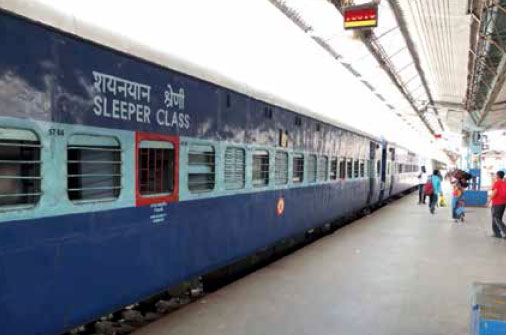WORKING in the Modi government is definitely a different experience. There are no undue pressures or threats, no expectations of anything other than work and no requests to favor companies or individuals. On the other hand, there is tremendous premium on integrity and pressure on deliverance and also high expectations towards meeting targets relating to infrastructure development. Clearly the focus is on delivery, not frills and this has indeed been a welcome change – like a whiff of fresh air.
Certainly this is not the way the system has been conducting itself in the past in this country, yet it appears that the change in the way of working is going to be permanent, for having tasted it once, the nation and its constituents would not find comfort in the ways of the past, regardless of the political shade of governance. Indian Railways, the lifeline of the nation, is also feeling fresh and rejuvenated. With tremendous emphasis on consolidation of the existing network and growth in infrastructure, and single minded focus on reforms, the lifeline of the nation is perhaps on the right trajectory.
Despite all good intentions, the massive railway system has not been able to truly live up to the expectations of the masses—inadequacy of line capacity has led to shortages of berths to travel on and freight wagons to lift and transport goods
Yet the fact remains that over the last few decades, addition of many times more trains that infrastructure can support has led to a scenario where massive congestion on the tracks critically affects punctuality, maintenance and also safety, with the tragic accidents in recent years bearing testimony to the same. Since the fifties while the track infrastructure has grown a measly 30 per cent, the traffic, both passenger and freight has jumped over sixteen times and this widening chasm has led to a scenario where there is a constant tussle between those who operate and those who build and maintain.
And the almost static passenger tariff, for a long time now is affecting railway revenues with its attendant consequences and symptoms and impacting almost all aspects of working of this great organisation. A corporate, and railways is definitely one, has to be run professionally with real concern for the bottom line if it is to succeed and succeed it must for that is the only way it can truly serve the society for which it was built in the first place.
Despite all good intentions and many improvements, the massive railway system has not been able to fully live up to the expectations of the masses – inadequacy of line capacity has led to shortages of berths to travel on and freight trains to lift and transport what needs to be lifted and transported. There is a perpetual contradiction, whether the railways is a sarkar (government) or vyapar (business) and therefore the business of fast track deliverance that entails quick decision making has always been an exercise that has been regarded as a risky affair.
YES it is true that the inherent contradictions that this organisation finds itself engulfed in, have emerged over decades. Complexity of processes has shrouded almost every facet of the organisation, the structures have not kept pace with the changing environment and needs, and culturally, we have deteriorated.

Sustained adhocism is the best way to pull organisations down. An organisation of over 13 lakh employees, covering the entire nation has to have its fundamentals steeped in good governance. Unfortunately, railways was always viewed as an organisation that could be forever sustained without commensurate inputs. Impromptu decisions to increase passenger trains taken regularly over long periods of time coupled with measures like keeping the fares static have caused sufficient damage. Despite massive checks over expenditure, checks that have started affecting operations, staff welfare as well as safety, we have no surpluses from revenues, despite only token provisioning towards depreciation. And our efforts towards monetization and generating non fare revenues are yet to bear full fruit.
WE are also yet to fully overcome the complexity of processes that its complex bureaucracy has taken to ridiculous extremes with processes not designed for efficiency but often at times to guard turf for the satisfaction of individuals. And the perpetuation of a feudal culture till very recently, when we came down with an iron hand.
Unfortunately, railways was always viewed as an organisation that could be forever sustained without commensurate inputs. Impromptu decisions to increase passenger trains taken regularly over long periods of time coupled with measures like keeping the fares static have caused sufficient damage
Where have we gone wrong? Perhaps the answer lies in the way we are structured – a vyapar in the garb of sarkar, a vyapar that needs to be conducted with all the precautions and rigmarole associated with sarkar, a vyapar where the sanctity of processes override that of deliverance and a vyapar that has no clearly defined chief executive, a functionality considered mandatory for any corporate. With these fundamental anomalies perfectly in place, while we can always aspire for and also achieve some modicum of excellence, we may perhaps never be able to fully exploit the potential of this great monolith.
Yet the railway system delivers almost 22,000 trains a day carrying 23 million passengers and over one million tonnes of freight across 8,000 stations spread through the length and breadth of the country, and that is why one often refers to it as the “Great Indian Railways” for it touches the lives of the entire populace, day in and day out. Its men (and women) keep the wheels moving even under severe constraints and often extreme working conditions and that is what makes them stand tall over all other classes of government servants.

Despite legacy issues, it is indeed gratifying that the efforts of the recent past have started showing. Safety scenario has improved, cleanliness levels have climbed a few notches, passenger amenities have improved, new landmarks have been achieved in doubling, electrification and other works, stations are being beautified, dedicated freight corridors have started emerging, construction of high speed line between Ahmedabad and Mumbai is on track and the first ever rail university of the country has started functioning. And this is not all; major strides are in the offing, in improving security levels through use of video cameras, in giving entertainment through provision of wi-fi at stations and trains, in improving safety through better signalling, development of stations through private participation, using artificial intelligence for enhancing security, digital measures etc. The intent of the present government in improving railways so that it can live up to the expectations of an emerging nation is fairly evident.
Railway Reforms is a key focus area of the government. Abolition of frills, matching accountability with authority, simplification of systems and processes, concern and sensitivity for the human resource, stress on integrity and ethical conduct are indeed measures that the national carrier is increasingly identifying itself with, and why not – these are the crucial building blocks of any great organisation. Sensitivity towards our clients and employees alike, something that we were rapidly losing sight of, is also fast getting restored.
Indian Railways is indeed one of the largest organisations on planet earth. Sustained efforts over a long period of time with reforms being at its core, is the only way to make a lasting difference. God willing, we shall. Jai Hind
The writer is Chairman of the Indian Railway Board












































